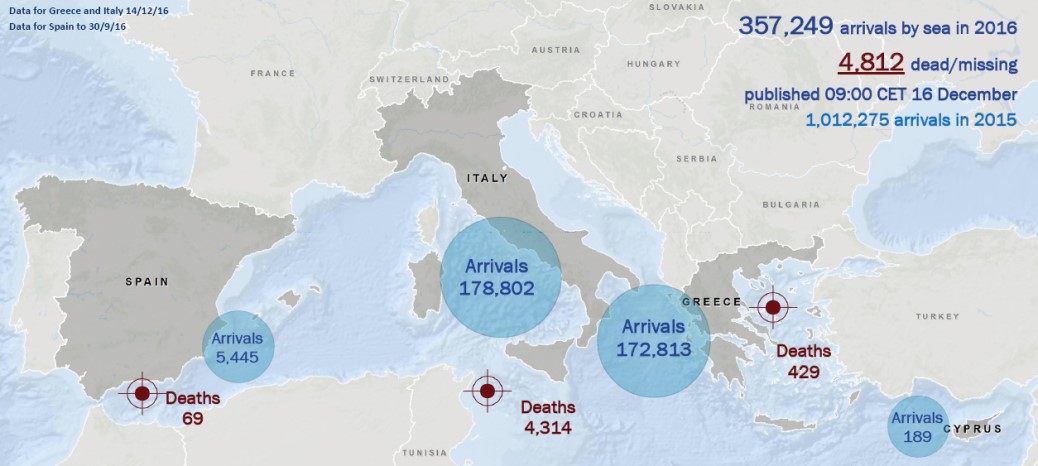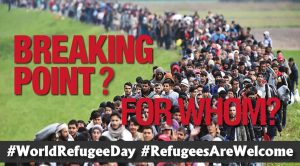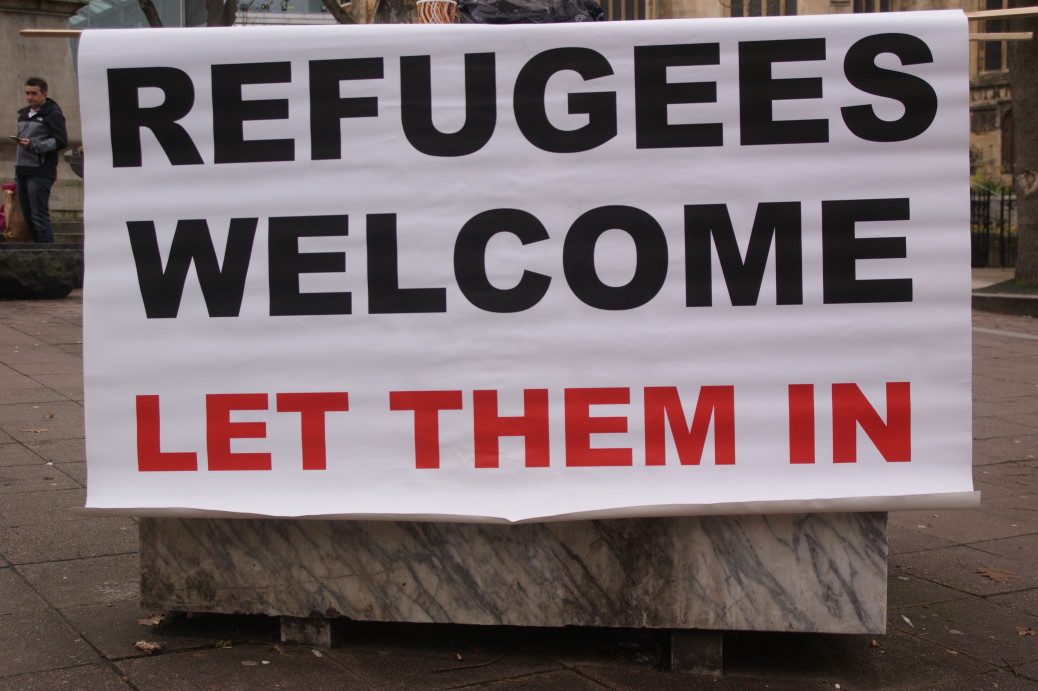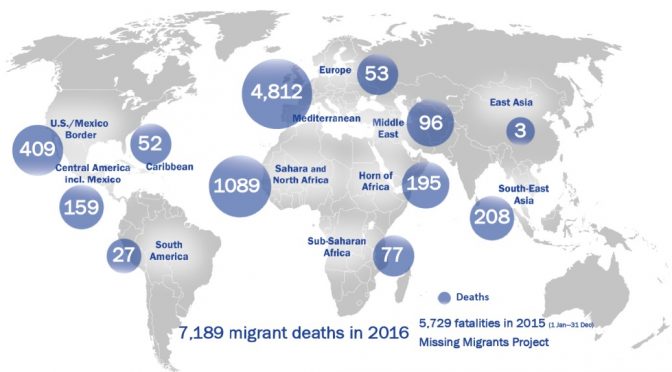International Migrants Day 2016
December 18 is International Migrants Day, falling in the middle of yet another broken ceasefire in Aleppo, Syria. The combination of 4.5 million refugees and 6.5 million internally displaced people means that half of Syria‘s 22m population are technically migrants, making it the biggest humanitarian refugee crisis and migration exodus since the Nazi era. Half-a-million have been killed in the civil war/uprising and there are few signs of an end in sight.
Dignity for all migrants
Two years ago, the United Nations Secretary-General, Ban Ki-moon said in hope:
“On International Migrants Day, let us reaffirm our commitment to shape diverse and open societies that provide opportunities and lives of dignity for all migrants.” – Ban Ki-moon, UN Secretary-General, 2014
Two years later and the outgoing Secretary General, at his last press conference, sounded a depressing note, describing:
“the carnage in Syria” as “a gaping hole in the global conscience” and Aleppo as “a synonym for hell”. “We have collectively failed the people of Syria. Peace will only prevail when it is accompanied by compassion, justice and accountability for the abominable crimes we have seen.” – Ban Ki-moon, UN Secretary-General, 2016
Crisis, Displacement, Migration…Relief, Asylum, Refuge
Over a quarter-of-a-billion of the world’s population are migrants – people who have changed country because of war, disaster or famine, and the poverty or threat to life brought on by them. Globalisation and the resultant increased geographical mobility, not to mention trafficking and exploitation mean that some nations have seen 8-fold increases in net migration since the 1990s. If we recognise our international origins many more of us, if not all of us, are migrants too.
If we recognise our international origins many more of us, if not all of us, are migrants too. Who is truly British or English when we are part Roman, part Saxon, part Viking, part Norman, part Dutch and many more besides.
Refugees from “forced displacement” recorded worldwide in 2015 numbered over 65 million according to UNHCR, the UN Refugee Agency. That’s nearly 1% of the world currently homeless, nationless, fleeing wars, terror, persecution and the slow death and disease of refugee poverty from relying on handouts and the generosity of others, NGOs, international aid and agencies.
Around 53,000 migrants have died since 2000 just attempting to reach the shores of more free, safe, developed nations, over half trying to get to Europe – some 6,000+ each year, most recently. Hundreds die every year attempting to enter America, similarly with Australia. Even if they make it, hundreds of thousands end up detained (350,000pa in the US) and returned, or imprisoned.
Sadly, the escalation of migrant deaths means that on average 20 die each day, with 2016 the worst on record at 7,200 deaths with 2 weeks left to run. It represents a 50% increase since 2014 which itself was double the figure for 2013. Some 4,800 deaths in the Meditteranean also represent a 33% increase over 2015, despite a 60% reduction in arrivals to Europe’s southern coasts.

Back in 1990, on 18 December, the UN General Assembly adopted the International Convention on the Protection of the Rights of All Migrant Workers and Members of Their Families. In 1997, some Asian migrant organisations began to commemorate 18 December as the International Day of Solidarity with Migrants. In 2000, the UN proclaimed that date, henceforward, to be International Migrants Day.
In remarks to the UN, in October 2013, Ban Ki-moon said:
“Migration is an expression of the human aspiration for dignity, safety and a better future. It is part of the social fabric, part of our very make-up as a human family.”
Resolutions but no Resolution
At a high-level meeting on migration at the United Nations in New York, 3-4 October 2014, Member States unanimously adopted a Declaration calling for “respect of human rights and international labour standards”, “commitment to fight human trafficking” and strongly condemning “manifestations of racism and intolerance.”
The declaration set out to “Strongly condemn the acts, manifestations and expressions of racism, racial discrimination, xenophobia and related intolerance against migrants and the stereotypes often applied to them, including on the basis of religion or belief.”
The need to “improve public perceptions of migrants and migration” was also stressed.
It further recognised, in the same declaration document, that “human mobility is a key factor for sustainable development”, something which many immigration reactive nations are seeking to restrict.
In 2016, September 19, the UN General Assembly held its first ever summit on large movements of refugees and migrants to enhance their protections. The resultant commitments, known as the New York Declaration for Refugees and Migrants (NY Declaration), reaffirm present international protections and pave the way for forthcoming new global compacts in 2018.
Political Breaking Point

In the UK, all the main parties bar the Greens at the last election in 2015 were in a race to the bottom to prevent economic migration, restrict benefits for 2-4 years, and tighten borders – despite the economic case for immigration. The EU Referendum in June 2016 saw migrant peoples both demonised and topping some people’s fears and reasons for voting. In the US, the Republicans and Donald Trump have lionised migrants and Muslims especially. Meanwhile, the city of New York, with its large immigrant communities has vowed to oppose any anti-migrant or Muslim registers or laws.
An issue for the world
It is not just Europe and America that are primary destinations, though. For instance, in the Middle East, the United Arab Emirates is made up of about 84% immigrants – millions from India, Pakistan, and Bangladesh, among others. The population has grown by some 500% since 1990. Some of the UAE migrant workers end up being “beaten, exploited and trapped into forced labour, according to an October 2014 report by Human Rights Watch.”
Migrant workers have also suffered greatly in Qatar during the building work of the 2022 World Cup football stadium with the tacit sanction of UEFA whilst it turns a blind eye to the poor human rights record on its immigrant workforce.
Amnesty International‘s Head of Refugee and Migrants Rights says:
“Political decision-makers need to show leadership by ensuring the human rights of migrants are protected, instead of taking cheap shots through scaremongering tactics. Poor migrants are the perfect political scapegoats – they have no money, no influence and they can’t vote. So if you’re a government whose policies are letting people down, you can blame it all on immigration.” – Amnesty International
Allowing and welcoming immigration is part of international development, yet we prefer to give aid and then say, “stay away”, cementing our “me first” attitudes and protectionist economic policies that are counter free market and prevent natural third world development. The longer we artificially maintain the global haves vs have-nots the more we encourage “desperation migration”. We need generous global action on poverty and economic opportunity, not selfish states. Anyone willing to risk life and limb to reach your borders is probably the kind of driven committed person who would be an asset to your country, community, and workforce.

